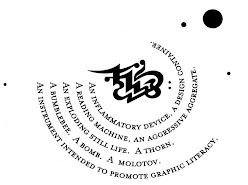
"It is said of Muad'dib that once when he saw a weed trying to grow between two rocks, he moved one of the rocks. Later, when the weed was seen to be flourishing, he covered it with the remaining rock. 'That was its fate,' he explained." --From The Commentaries Of M'Uad Dib (DUNE, Frank Herbert).
I've always been struck by the taciturn Nietzschean aspects of M'uad Dib's character as a leader. One of Frank Herbert's points in DUNE was a warning-- beware of charismatic heroes. When entrusted with great power, they can do great damage to a civilization. Even a brief sweep of history can illustrate this point.
I wanted to try applying the lessons learned from the Wednesday Comics experience to a different subject, here finding a source which would be difficult to illustrate as a page of comics, given that there is very little suggested action. I find that with the format of Wednesday Comics (which is really the traditional Sunday Comics page), one must condense the plot and action to the briefest yet most vivd bursts of information available-- there is a lot of space on the page for the illustrations to really overwhelm the reader/viewer, but there isn't a lot of space for story development in the sense of how we'd develop a plot or work up dialogue for a typical comic book page. In a comic book, one page may be well drawn or well written, but it is still just a single facet of a larger whole. One page can be preceded or followed by another, but no one page carries the entire weight of the sustained narrative. The Wednesday Comics single page format forces the artist to create a story unit which may well be part of a larger storyline, however it still must be able to stand alone.
This depiction of Paul M'uad Dib and the Fremen Stilgar is based on paintings John Schoenherr did for an illustrated edition of Dune published by Berkley Books in 1977. Frank Herbert said that of all the visual depictions of his ideas, Schoenherr's work was closest to the way Dune's people and things looked in his own mind. The colors here are by Lovern Kindzierski, who worked with me on the second half of the Strange Adventures strip.
